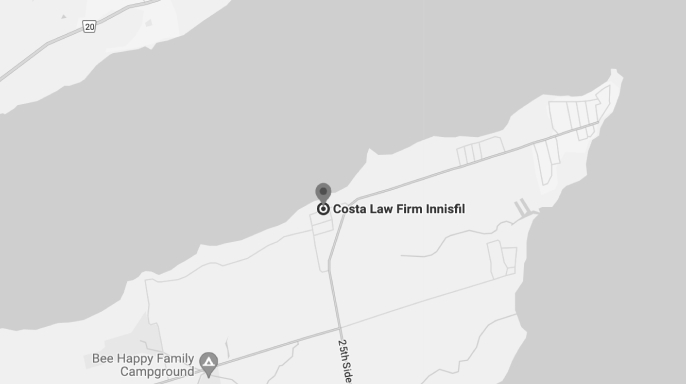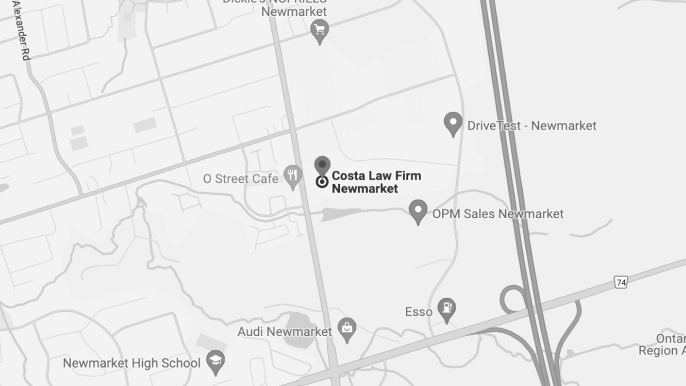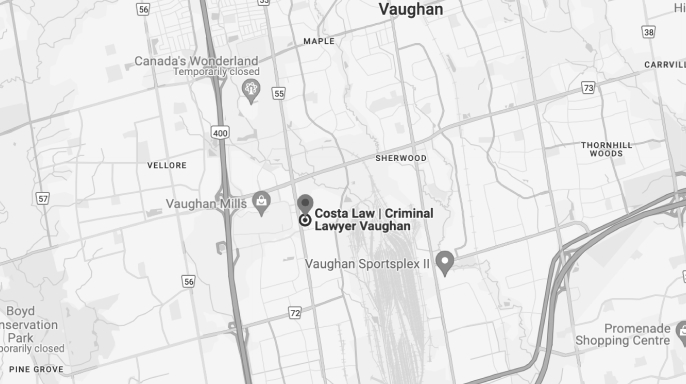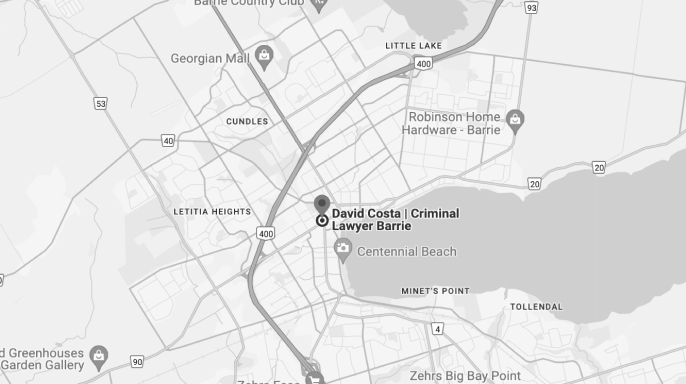Kidnapping Lawyer in Toronto
Facing kidnapping charges in Toronto can be a distressing situation for an accused person. It may have severe consequences on your professional and personal life. It can also have potential legal repercussions.
In such circumstances, it is best to seek professional help from a skilled criminal defence lawyer. Kidnapping is considered a serious criminal offence under the Criminal Code of Canada, and a detailed understanding of this offence requires a thorough knowledge of the law.
While there has been a significant decrease in these cases over the years, the prevalence of kidnapping cases still underscores the urgency and significance of these criminal charges. At Costa Law, we offer reliable legal representation and counsel to navigate these complex legal cases. Indeed, we lean on our deep understanding of Canadian criminal law and commit to achieving the best possible case outcome for our clients.

Understanding Kidnapping Charges
Kidnapping, as outlined in Section 279(1) of Canada’s Criminal Code, involves unlawful seizures, confinement, and carrying away an individual with the aim to cause him or her to be imprisoned or confined against their will. The primary difference between kidnapping and forcible confinement lies in the accused’s intent and action.
Is kidnapping the same as Forcible Confinement?
Note that forcible confinement involves an unlawful restriction of an individual’s movement. On the other hand, kidnapping has the extra aspect of carrying away or moving the confined person against their will. Common scenarios that may lead to charges related to kidnapping and forcible confinement arise in the context of child custody disputes, instances of abduction, and domestic disputes.
Despite having different definitions, both criminal charges are serious and have severe legal consequences if you are convicted. That is why you need immediate legal counsel and representation if you are accused of any crime related to kidnapping or other violent offences.

Elements of Kidnapping and Forcible Confinement Offences
For you to be convicted, the prosecution must establish all critical aspects of kidnapping and forcible confinement beyond a reasonable doubt. If you are charged with forcible confinement, Section 279(2) of the Criminal Code requires the prosecution to provide credible evidence that:
- You (the defendant) acted in a way that imprisoned, confined or forcibly seized an individual
- You acted unlawfully (without lawful justification or lawful authority)
- The victim never offered lawful consent to your actions
If you are charged with a kidnapping offence, section 279(1) of the Criminal Code requires the prosecution to prove all critical elements of this offence beyond a reasonable doubt. These elements include:
- You (the accused) seized, confined, or carried the victim away
- You did this with the aim or intent to imprison or confine the victim against their will
- You had no lawful authority or justification to do this
- The victim did not offer lawful consent to their kidnapping
Note that both criminal offences anchor deeply on the element of lawful consent. Therefore, the absence of lawful consent from the victim is a critical element that the prosecution must prove beyond a reasonable doubt.
In addition, it is imperative to understand that the accused’s intent to imprison or confine the victim against their will is the backbone of kidnapping and forcible confinement charges. That is why a conviction carries potentially severe legal repercussions.
Your Legal Accountability in Kidnapping and Forcible Confinement Case
If you are facing charges related to forcible confinement and kidnapping, understanding your legal accountability is crucial. Even an indirect participation in such offences could expose you to a criminal conviction under the Canadian Criminal Code.
The moment you realize that you are being linked to a case of kidnapping, it is crucial to contact a skilled criminal lawyer. A trained criminal defence lawyer can help you understand the gravity of the allegations or charges filed against you.
An important element we consider is that the crime of kidnapping or forcible confinement is legally regarded as continuous until the individual (victim) is released. Suppose you participated in the abduction or detention of a person and left while the individual was not freed. In that case, you would be held accountable for the entire period, right to the moment the individual is freed.
This element of continuity underscores the gravity of a conviction and the critical need for reliable legal representation if you ever face these charges. At Costa Law Firm, we have experienced kidnapping lawyers with the legal skills to defend your kidnapping or forcible confinement case.
The Punishment for Kidnapping in Toronto
A conviction for kidnapping and forcible confinement charges can lead to serious legal consequences. The mandatory minimum sentences and other penalties can be severe. This underscores the gravity of both crimes under the Canadian Criminal Code. That is why you need reliable legal aid from an experienced criminal lawyer.
Indictable or Hybrid Offence?
The Canadian legal system considers forcible confinement a straight indictable offence. On the other hand, kidnapping is classified as a hybrid offence. Depending on the unique circumstances of your kidnapping or forcible confinement charges, the prosecution can choose to proceed summarily or indictment.
Penalties
As a straight indictable offence, forcible confinement carries a maximum penalty of up to life imprisonment. There are also mandatory minimum penalties that might apply depending on the nature of your criminal case or personal circumstances. It is crucial to mention that the maximum punishment and actual sentence majorly depend on various factors.
For example, the court will consider the level of violence used, the severity of the crime, the duration of the kidnapping or confinement, and the victim’s health effects (both physical and psychological). The offender’s personal circumstances may also be considered. For example, a first-time offender will likely get a lighter penalty than a second or subsequent offence.
If a person commits an offence under Section 279(1.1), they may be found guilty of kidnapping. If a prohibited firearm was used to commit the offence in the direction of, benefit of, or association with any criminal organization, the offender could face a maximum penalty of life in prison.
You (the offender) may also face a minimum sentence of 5 years (if it is a first offence) and 7 years (if it is a second or subsequent offence). If no criminal organization was involved in the crime but a firearm was used to commit it, the offender faces up to imprisonment for life and a mandatory minimum sentence of four years.
If the victim is under 16, the offender faces up to imprisonment for life and a mandatory minimum sentence of five years. Note that the mandatory minimum sentences may differ if the offender is a guardian, custodial parent, or someone with the lawful care of the victim.
Defending Against Kidnapping Charges
Defending against charges of kidnapping or forcible confinement requires a good defence strategy based on the circumstances of your case. At Costa Law, we have a team of knowledgeable criminal defence lawyers with a profound understanding of the criminal justice system.
Remember, our experienced lawyer will apply a wealth of criminal law knowledge and a deep understanding of your unlawful confinement case to build a strong defence. Here are potential defence strategies we can explore:
1. Self-Defence
A key argument in kidnapping cases could be that you (the accused person) acted in self-defence or defence of another person. To successfully invoke self-defence, you (the accused) must demonstrate that you were facing an immediate threat of harm and that your actions were necessary to protect yourself or someone else.
Notably, the actions taken must be proportionate to the threat you faced. Our criminal defence lawyer will focus on proving that you had no option but to act as you did.
2. Belief in Lawful Authority
The defence of believing in lawful authority may apply when you (the defendant) reasonably believed that you had legal grounds to confine the victim. For example, this defence might arise in cases of mistaken identity, where you thought you were performing a lawful arrest of a suspected criminal.
The critical aspect of this defence is the reasonableness of the belief—did you have justifiable grounds to think your actions were legally permitted?
3. Consent
Although not commonly used, consent can be a defence in certain kidnapping or confinement cases. This argument holds that the alleged victim willingly participated in the confinement and that their involvement was voluntary. The defence would need to present evidence showing that the victim agreed to the situation, thus negating the accusation of forcible confinement.
4. Challenging the Credibility of the Complainant
In some cases, the defence may focus on questioning the complainant’s credibility. This strategy involves cross-examining the alleged victim and presenting evidence that may contradict their claims. If inconsistencies or weaknesses in the complainant’s story are uncovered, it can cast doubt on their testimony and weaken the prosecution’s case.
5. Insufficient Evidence
The Crown prosecution should prove beyond a reasonable doubt that you (the accused) are guilty of kidnapping. If the evidence presented is weak or does not fulfill the legal requirements for the charge, the defence can successfully argue that there is insufficient evidence to convict you. This is a common and effective strategy, as any failure by the prosecution to meet its burden of proof results in acquittal.
The Role of Our Toronto Kidnapping Lawyer
Criminal convictions related to kidnapping, forcible confinement, and other violent offences like sexual assault and aggravated assault often result in a criminal record. This can severely affect your reputation and professional life, including difficulty travelling abroad and finding employment. Here is how our knowledgeable criminal lawyer can help.
Provide Legal Counsel and Representation
After being charged with any crime within the context of forcible confinement and kidnapping, you should accept legal aid to understand your rights and the entire court process. Note that all charges related to child abduction, kidnapping, and forcible confinement are vigorously prosecuted under Canadian law.
That is why you need a reliable defence team with a proven track record of defending such charges. At Costa Law, we have highly experienced lawyers who will represent you during preliminary inquiry until the end of your case.
Investigation and Evidence Collection
The cornerstone of a good defence is a thorough investigation and evidence collection. Our defence lawyers use their extensive law knowledge to analyze the prosecutor’s evidence to identify inaccuracies, violations of your rights, and inconsistencies that could get the case against you dropped or weakened.
Create an Effective Defence Strategy
Once we have gathered and analyzed information or evidence relevant to your case, we will develop a defence strategy to address the specific charges levelled against you. Our full-service law office has earned an unmatched reputation for our results-driven approach to criminal defence.
Ongoing Legal Support
Our lawyers play a multi-faceted role in protecting your fundamental rights and advocating on your behalf. From the moment you contact us to trial representation, we will be a trusted ally in fighting for the best possible outcome.
Schedule a Free Consultation
Do not let the complexities of the legal system intimidate you. Our Toronto kidnapping lawyers are ready to help. Schedule a free, no-obligation consultation today and discuss your case with a skilled lawyer.
Request A Consultation
Testimonials
What our clients are saying
Contact Us
Costa Law Firm
Costa Law Firm is a law firm located in Toronto with exceptional credentials that stands out for its commitment to client service. Our service minded approach has led Costa Law Firm to be one of the most reliable law firms in Toronto.
Address
Main Office:
1015 Bloor Street West, Toronto, Ontario M6H 1M1
Phone: (416) 535-6329
Fax: 416-535-4735
info@costalawfirm.ca
We provide emergency services for urgent matters.
Consultation Office:
17075 Leslie St Unit 6, Newmarket, ON L3Y 8E1Vaughan location 290 Caldari Rd Unit 8, Concord, ON L4K 4J4, CanadaBarrie location 49 High St 3rd floor, Barrie, ON L4N 5J4, Canada











